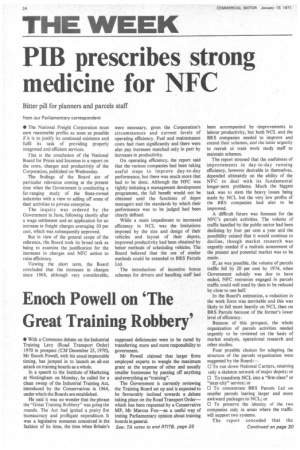PIB prescribes strong medicine for NFC
Page 26

If you've noticed an error in this article please click here to report it so we can fix it.
Bitter pill for planners and parcels staff
from our Parliamentary correspondent O The National Freight Corporation must earn reasonable profits as soon as possible if it is to justify its continued existence and fulfil its task of providing properly integrated and efficient services.
This is the conclusion of the National Board for Prices and Incomes in a report on the costs, charges and productivity of the Corporation, published on Wednesday.
The findings of the Board are of particular relevance coming at the present time when the Government is conducting a far-ranging study of the State-owned industries with a view to selling off some of their activities to private enterprise.
The inquiry was ordered by the Government in June, following shortly after a wage settlement and an application for an increase in freight charges averaging 10 per cent, which was subsequently approved.
But in view of the general scope of the reference, the Board took its broad task as being to examine the justification for the increases in charges and NFC action to raise efficiency.
Viewing the short term, the Board concluded that the increases in charges since 1968, although very considerable, were necessary, given the Corporation's circumstances and current levels of operating efficiency. Fuel and maintenance costs had risen significantly and there were also pay increases matched only in part by increases in productivity.
On operating efficiency, the report said that the various companies had been taking useful steps to improve day-to-day performance, but there was much more that had to be done. Although the NFC was rightly initiating a management development programme, the full benefit would not be obtained until the functions of depot managers and the standards by which their performance was to be judged had been clearly defined.
While a main impediment to increased efficiency in NCL was the limitations imposed by the size and design of their vehicles and layout of their depots, improved productivity had been obtained by better methods of scheduling vehicles. The Board believed that the use of similar methods could be extended to BRS Parcels Ltd.
The introduction of incentive bonus schemes for drivers and handling staff had
been accompanied by 'improvements in labour productivity, but both NCL and the BRS companies needed to improve and extend their schemes, and the latter urgently to recruit or train work study staff to maintain schemes.
The report stressed that the usefulness of improvements in day-to-day running efficiency, however desirable in themselves, depended ultimately on the ability of the NFC to deal with its fundamental longer-term problems. Much the biggest task was to stem the heavy losses being made by NCL but the very low profits of the BRS companies had also to be improved.
A difficult future was foreseen for the NFC's parcels activities. The volume of traffic handled by the public sector had been declining by four per cent a year and the possibility existed that it would continue to decline, though market research was urgently needed if a realistic assessment of the present and potential market was to be made.
If, as was possible, the volume of parcels traffic fell bY 20 per cent by 1974, when Government subsidy was due to have ended, NFC resources engaged in parcels traffic could well need by then to be reduced by close to one half.
In the Board's estimation, a reduction in the work force was inevitable and this was likely to fall more heavily on NCL than on BRS Parcels because of the former's lower level of efficiency.
Because of this prospect, the whole organization of parcels activities needed urgently to be reviewed on the basis of market analysis, operational research and other studies.
Four possible choices for adapting the structure of the parcels organization were suggested by the Board:— 0 To run down National Carriers, retaining only a skeleton network of major depots; or O To transform NCL into a "first-class" or "inter-city" service; or O To concentrate BRS Parcels Ltd on smaller parcels leaving larger and more awkward packages to NCL; or O To preserve the identity of the two companies only in areas where the traffic will support two systems.
The report conceded that the Continued on page 30




































































































































